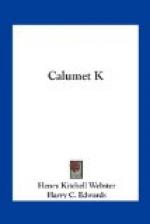But the public overlooked, indeed it had no means of knowing, one important fact. The members of the Clique were new men in the public eye. They represented apparently unlimited capital, but they were young, eager, overstrung; flushed with the prospect of success, they were talking for publication. They believed they knew of every bushel in the country that was to be had, and they allowed themselves to say that they had already bought more than this. If this were true, Page was beaten. But it was not true. The young men of the Clique had forgotten that Page had trained agents in every part of the world; that he had alliances with great railroad and steamer lines, that he had a weather bureau and a system of crop reports that outdid those of the United States Government, that he could command more money than two such Cliques, and, most important of all, that he did not talk for publication. The young speculators were matching their wits against a great machine. Page had the wheat, he was making the effort of his career to deliver it, and he had no idea of losing.
Already millions of bushels had been rushed into Chicago. It was here that the fight took on its spectacular features, for the grain must be weighed and inspected before it could be accepted by the Board of Trade, and this could be done only in “regular” warehouses. The struggle had been to get control of these warehouses. It was here that the Clique had done their shrewdest work, and they had supposed that Page was finally outwitted, until they discovered that he had coolly set about building a million-bushel annex to his new house, Calumet K. And so it was that the newspapers learned that on the chance of completing Calumet K before the thirty-first of December hung the whole question of winning and losing; that if Bannon should fail, Page would be short two million bushels. And then came reporters and newspaper illustrators, who hung about the office and badgered Hilda, or perched on timber piles and sketched until Bannon or Peterson or Max could get at them and drive them out. Young men with snap-shot cameras waylaid Bannon on his way to luncheon, and published, with his picture, elaborate stories of his skill in averting a strike— stories that were not at all true.




